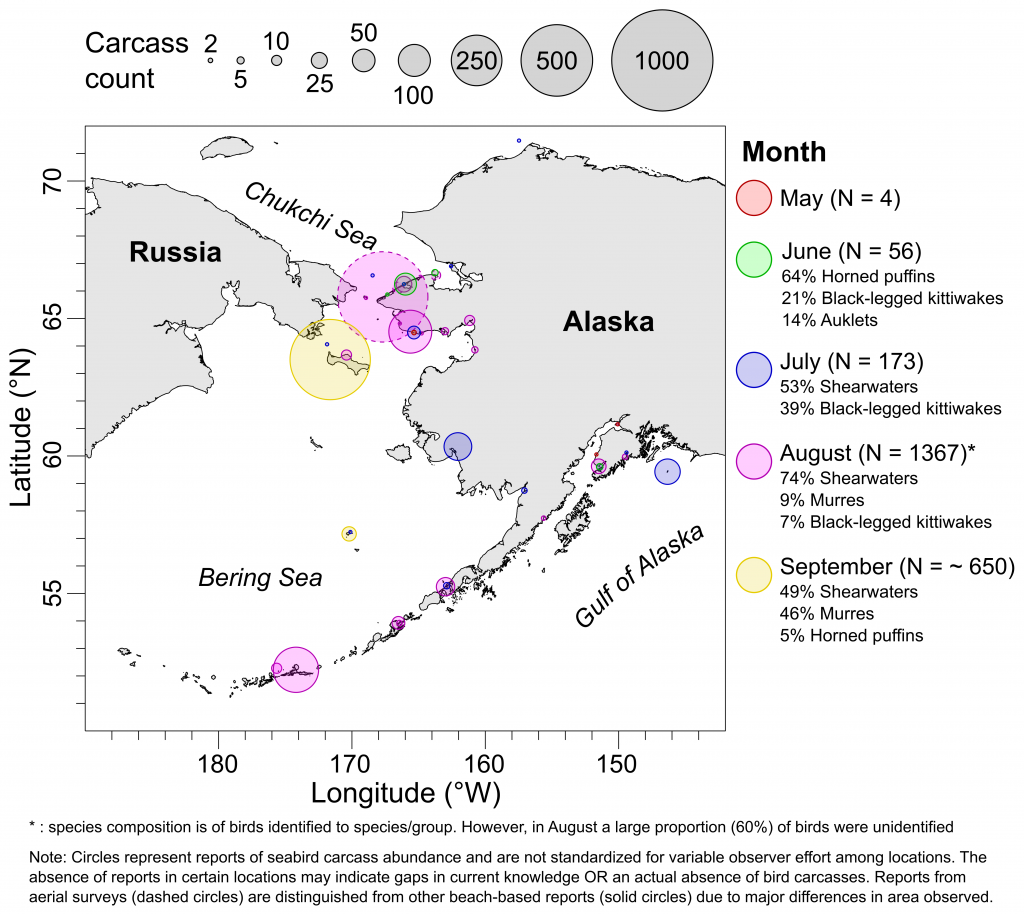updated 9/6/21 with information on Avian Botulism Type C
What’s Happening?
From May to September 2021, partners reported dead and dying seabirds from the Bering Strait region, Aleutian Islands, and the Gulf of Alaska. The main species reported from the Bering Sea and Aleutian Islands were shearwaters, but also included kittiwakes, murres, and puffins. A separate die-off at Middleton Island occurred in late July and affected kittiwakes and gulls. This event has been tied to the first case of Avian Botulism Type C in Alaska – a disease that does not affect humans.
Historically, seabird die-offs are not uncommon in Alaska, but since 2015 these events have occurred annually. In addition to frequency, these die-off events are unusual due to the number and variety of dead birds, broad geographic area affected, and extended duration.
As of September 2021, ~2,200 seabird carcasses have been reported and the die-off remains a concern for rural communities that rely on the marine ecosystem for subsistence.

In August, a large portion (60%) of birds were unidentified. In the map above, aerial surveys (dashed circle) are distinguished from beach counts (solid circles) because much larger areas were covered by aerial surveys, resulting in more observations. Data were provided by University of Alaska Fairbanks/Alaska Sea Grant, Kawerak Inc., the National Park Service, Alaska Department of Fish and Game, U.S. Fish and Wildlife Service, and Coastal Observation and Seabird Survey Team (COASST) participants.
What’s Being Done?
The U.S. Fish and Wildlife Service is coordinating with federal, state, tribal governments, researchers and community members to compile reports and collect carcasses for examination and testing by the U.S. Geological Survey National Wildlife Health Center (NWHC).
Bering Sea and Aleutians. Of the 12 carcasses submitted from the region, starvation is the suspected cause of death. Results for avian influenza tests were negative and tests for harmful algal biotoxins are pending and will be shared once available.
Gulf of Alaska, Middleton Island. Carcasses were submitted to the NWHC and after other potential causes of death had been eliminated, Avian Botulism testing was conducted. Two kittiwakes tested positive for Avian Botulism Type C, which is specific to birds and does not affect humans; however, always cook game meat to 165 degrees F. This is the first reported case of Avian Botulism in Alaska. The NWHC and seabird researchers continue to investigate the source of Avian Botulism at Middleton Island, which requires very specific environmental conditions for the bacteria to grow.
What Can I Do?
Report sick or dead birds to regional partners:
- North Slope: Taqulik Hepa (907) 852-0350
- Northwest Arctic: Cyrus Harris (907) 442-7914
- Bering Strait: Brandon Ahmasuk (907) 443-4265 or Gay Sheffield (907) 434-1149
- Yukon-Kuskokwim Delta: Jennifer Hooper (907) 543-7470
- Bristol Bay: Gayla Hoseth (907) 842-6252
- Pribilof Islands: Lauren Divine (907) 891-3031
- Aleutians: Karen Pletnikoff (907) 222-4286
- Or report by phone or email to the USFWS: 1-866-527-3358 or AK_MBM@FWS.GOV
Information needed when reporting dead or sick birds:
- Location, time & date observed
- Size of area observed (e.g., length of beach walked)
- Type & number of birds (count or estimate)
- Photos of sick/dead birds
- Videos of any unusual behavior
Download a printable factsheet with this information:
